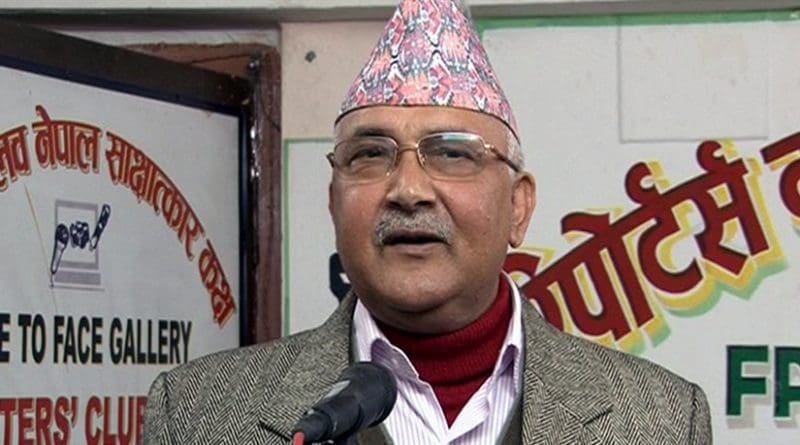Nepal: Oli Wins An Unprecedented Trust Vote – Analysis
By SAAG
By Dr. S. Chandrasekharan
K. P. Oli, the newly elected Prime Minister of the Left Alliance, won his first vote of confidence with an unprecedented and overwhelming majority of 208 against 60 by the opposition in a total of 275 seats. Of the rest, six were absent and one abstained. Leaving the days of Monarchy and that of Rana rule, never before has Nepal seen after B.P. Koirala, the emergence of a very strong and powerful leader. This could work both ways and as one analyst has said there has emerged an “authoritarian template” and it remains to be seen whether it will be used for bringing good governance, development and prosperity or go back to the old days of authoritarianism!
Significantly, the two Madhesi groups- the SSF-N of Upendra Yadav and the RJP-N supported Oli. Of these, SSF- N has already signed an agreement to join the government after getting a “commitment” from Oli about possible constitutional amendments that includes Article 274 that stipulates a requirement of the consent of a majority of provinces to revise political boundaries. The other group led by Mahant Thakur had no choice but to follow suit!
The Madhesi groups also obliged the ruling parties by supporting the UML candidate Mrs. Bhandari for another term of presidentship and it is being said that Mahant Thakur- the Chief Coordinator of the RJP N is being offered the post of Vice Presidentship. If the idea is to keep Mahant Thakur away from Terai politics, the offer of Vice Presidentship will suit the Oli government as the popular Terai leader will no longer be of any help to the Madhesis.
It was also sad to see the Nepali Congress being relegated to a presence of less than 25 percent that will not enable it even to call for a special house session or initiate any impeachment proceedings. As for revival, much would depend on the older leadership who were responsible for the steady decline of the party and there still appears to be no discussion or introspection on the latest debacle in the elections. Have they learnt a lesson? Not yet, it appears.
Gagan Thapa, the youth leader of the Nepali Congress ( it was nice to see him speaking on behalf of the Nepali Congress), made a very responsible speech and he hoped that Oli will not become an authoritarian leader, much like Lee Kuan Yew of Singapore and Mahathir Mohammed of Malaysia!
Maoist chief Dahal in his speech made a timely reminder that it is time to cut down on speeches and let their action do the talking. He also said that the people in electing them have supported their agenda of stability, good governance, development and prosperity.
Oli in his speech elsewhere, again mentioned that he would strive for peace, stability, development, prosperity but made a significant addition by mentioning that he would go for “national unity.” It is therefore hoped that in the interest of stability and inclusiveness, Oli who had been against any constitutional amendment before would now take it up as his first task to make the desired constitutional changes as demanded by the Madhesi groups. By successfully negotiating with the Madhesi groups individually, Oli has for the time being silenced them.
As for the Madhesi groups, reports indicate that the two groups of late are not getting on well with each other and this works to the advantage of ruling parties as the clamour of the groups appear to be more for ministerial berths and positions rather than doing what is good for the Madhesi people. In the process other discriminated minorities like Janajathis who joined the Madhesi bandwagon appear to have been abandoned. This is unfortunate.
The emergence of a strong man in Oli with an overwhelming majority and mandate would be welcomed by the Chinese. They need to deal with Oli and no one else. As someone in the media has pointed out, China should be pleased as the funding for Belt Road Initiative would need a level of stability which only an authoritarian regime can guarantee!
K.P.Oli has also openly said that he would get closer to China in order to get a better leverage with India. Soon after the elections, his first visit was to the China border at Rasuwa and it was his hope that a diversification of trade with China with a railway line from Keirung to Kathmandu would meet his requirements. This is not going to be easy nor would it occur anytime in the near future.
As said earlier, repeatedly on the subject, the best India should do, is to wait and watch and let Nepal decide on what kind of relationship it wants to have with India rather than express any concern of Nepal getting closer to China. There appears to be no need to rush to “reset” the policy towards Nepal as some analysts have suggested.


Time India learnt a lesson on the need to have good relationship with its neighbors instead of throwing its weight around. A good lesson for BJP.